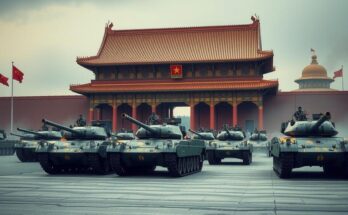The U.S. boycott of the G20 meeting in Johannesburg underscores rising tensions with South Africa, particularly over Israel-related legal actions by international bodies. Trump’s “America First” policy emphasizes national sovereignty, complicating U.S.-South African relations amid conflicting global governance priorities. This boycott could further isolate the U.S. and destabilize the G20’s role in international diplomacy.
The United States’ decision to boycott the G20 Foreign Ministers’ Meeting in Johannesburg carries substantial diplomatic and geopolitical ramifications. This action underscores the increasing tensions between Washington and Pretoria, particularly regarding global governance and Middle Eastern politics. South Africa’s criticism of U.S. foreign policy, especially concerning Israel, is a primary factor in these rising tensions, involving key international legal institutions such as the International Criminal Court (ICC) and the International Court of Justice (ICJ).
Under President Donald Trump, U.S. foreign policy shifted towards an “America First” agenda, favoring national sovereignty over collective international cooperation. This stance argues that global institutions often undermine American interests and disproportionately target the U.S. and its allies. Trump has criticized bodies like the World Trade Organization, the United Nations, and notably, the ICC for perceived biases against the United States.
A central point of contention between Washington and Pretoria arises from the ICC’s investigations into alleged war crimes related to U.S. and Israeli actions. The Trump administration had previously sanctioned ICC officials attempting to investigate U.S. military actions in Afghanistan. Although President Joe Biden rescinded these sanctions, tensions escalated when the ICC sought an arrest warrant against Israeli Prime Minister Benjamin Netanyahu for alleged war crimes in Gaza.
South Africa’s pivotal role in initiating the ICC case against Israel has exacerbated friction with the U.S. Congress responded vigorously to the ICC’s actions, viewing them as detrimental to a key ally in the Middle East, leading to calls for sanctions against the ICC for its politically charged prosecutions.
Further straining relations, South Africa brought a case against Israel before the ICJ, accusing it of genocide in Gaza. The ICJ’s agreement to hear this case aligns South Africa with critics of Israeli policies on the global stage, creating a schism with Washington. In January 2024, South Africa partnered with Malaysia to advocate for the enforcement of ICC and ICJ rulings, contrasting with the U.S.’s attempts to undercut these decisions, resulting in escalating diplomatic tensions.
U.S. Secretary of State Marco Rubio announced his decision to boycott the G20 meeting in Johannesburg, which signals a significant rejection of South Africa’s stance on Israel. This diplomatic move mirrors prior U.S. efforts to challenge multilateral institutions when their stances conflict with American interests, particularly under Trump’s administration, which sought to reshape discussions on several global platforms.
The implications of the U.S. boycott extend beyond symbolism, also affecting economic and diplomatic relations. The U.S. has increasingly criticized South Africa’s domestic policies, particularly regarding land reforms, with allegations of racially motivated land seizures being a significant focal point. These tensions are further compounded by decreasing U.S. financial aid to South Africa, which may push Pretoria closer to relationships with China, Russia, and other BRICS nations.
The G20 serves as a crucial forum for global economic cooperation, uniting leading economies to tackle international challenges. The U.S. boycott of the upcoming foreign ministers’ meeting raises valid concerns about the future cohesion of the G20, undermining its past role in stabilizing financial markets, coordinating policies, and addressing geopolitical crises.
In summary, the U.S. boycott of the G20 Foreign Ministers’ Meeting highlights the deepening conflicts between Washington and Pretoria due to differing stances on Israel and international legal frameworks. President Trump’s foreign policy approach, which seeks to prioritize U.S. interests over multilateral cooperation, has led to tensions that culminate in economic repercussions and diplomatic isolation. As South Africa aligns itself with alternative global coalitions, the implications for international relations and the effectiveness of the G20 could be profound.
Original Source: moderndiplomacy.eu




